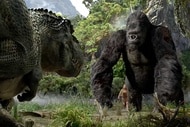Create a free profile to get unlimited access to exclusive videos, sweepstakes, and more!
The Lion King cast improvised the whole movie
Would you believe that a lot of what went into the live-action-ish adaptation of The Lion King — pouncing into theaters tomorrow — was actually improvised stuff that director Jon Favreau wanted to keep in the movie?
SYFY WIRE's Andre Meadows found that out when he interviewed the director and cast behind those uncanny valley animals (which look so real you have to keep reminding yourself they're CGI). Don't worry, because your childhood isn't about to be ruined.
"You have a story that everybody knows so well with Lion King," Favreau said. "You have all of the things that people understand and come to expect from it, so you have to take advantage of the opportunities where you differentiate yourself."
He kept everything '90s kids remember about the animated Disney movie that rocked the summer of '94, from that iconic "Hakuna Matata" scene with Simba, Pumbaa and Timon’s silhouettes against a full moon to Mufasa's original voice (James Earl Jones). Then he added some magic of his own by really letting the actors explore their characters and scenes far beyond Pride Rock.
Favreau wanted the actors to feel as if they were really the lions and hyenas and meerkats, which is why he often had them voicing scenes together in a black box theater and allowing them to overlap and try things different ways. He encouraged them to improv as much as they wanted to breathe the most life into their characters.
"The first day, Jon had us throw our scripts down and literally improvise the entire movie," Eichner (Timon) remembered.
Eichner and Seth Rogen (Pumbaa, who else?) obviously had a blast with that. So much of what started as improv experimentation ended up in the movie because Favreau just thought it was pure genius. There was so much material that the director couldn't fit it all into the movie, because, as Eichner said, "there was a whole other movie you could make."
Expect to hear some hilarious takes on "Hakuna Matata."
This article was contributed to by Elizabeth Rayne.


























